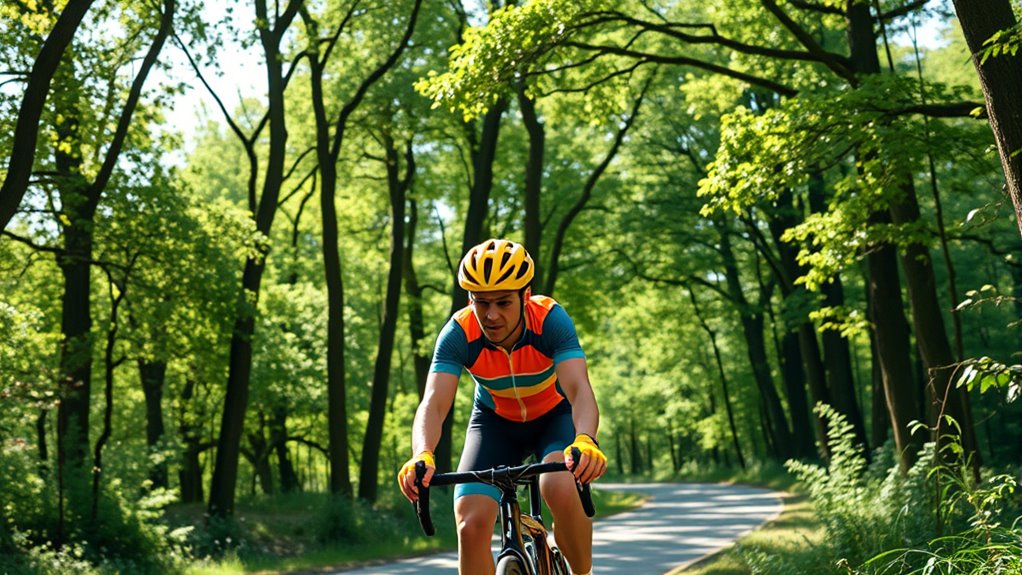Connecting with experienced cyclists can transform your riding experience by boosting your confidence and teaching essential safety and technical skills. Mentors show you how to handle different terrains, navigate traffic, and maintain your bike properly, all while fostering a supportive community. They also help you set realistic goals and stay motivated. If you’re enthusiastic to discover more ways mentorship can improve your cycling journey, there’s plenty more to explore ahead.
Key Takeaways
- Mentors provide hands-on guidance to improve riding techniques, safety awareness, and hazard management for new cyclists.
- Experienced riders share practical tips on navigating terrains, traffic, and bike maintenance to build confidence.
- Mentorship fosters community, motivation, and goal-setting, encouraging continued skill development and enjoyment.
- Mentors demonstrate cycling etiquette and safety principles, promoting respectful and responsible riding practices.
- Ongoing support and encouragement from mentors help bridge the gap between beginner and experienced rider.

Have you ever wondered how experienced cyclists pass on their skills and passion to newcomers? It’s often through mentorship—a personal, hands-on approach that transforms a novice’s riding experience. When you’re just starting out, cycling can feel overwhelming. The gear, the rules of the road, the proper techniques—there’s a lot to learn. But with an experienced rider by your side, those hurdles become manageable. Mentors share their knowledge not just through instructions but by demonstrating confidence and good habits, which in turn boost your own confidence. They show you how to handle different terrains, navigate traffic safely, and maintain your bike properly. This practical guidance makes a huge difference in how quickly and comfortably you develop your skills. For example, many mentors incorporate smart home technology principles to enhance safety and efficiency during rides, which can be particularly useful in navigating complex urban environments. Additionally, understanding the importance of proper risk management strategies can help you stay safe and prepared during rides. Developing good cycling etiquette is also essential for respectful and safe riding within the community. Learning about bike maintenance is crucial for ensuring your bike stays in top condition and prevents breakdowns during rides. Moreover, mentors often emphasize the significance of consistent practice to solidify new skills and build muscle memory, which accelerates your progress.
Mentorship transforms novice cyclists by sharing confidence, safety skills, and practical guidance for a smoother riding journey.
Mentors don’t just teach riding techniques; they also instill safety awareness and cycling etiquette. You learn how to position yourself on the road, communicate with other cyclists and drivers, and handle unexpected situations like sudden stops or rough terrain. Having someone to point out potential hazards in real time helps you build good judgment and reflexes. It’s one thing to read about these things, but experiencing them with an experienced rider’s support makes the lessons stick. Plus, observing a mentor manage challenges calmly and confidently inspires you to adopt a similar mindset. That sense of reassurance is critical, especially when you’re still gaining confidence on the bike.
Beyond technical skills, cycling mentorship fosters community and motivation. When you ride with a mentor, you’re introduced to the broader cycling scene—group rides, local events, and clubs. Their encouragement keeps you motivated to keep improving and exploring new routes. Mentorship also helps you set realistic goals, whether that’s conquering a challenging hill or completing your first long-distance ride. Your mentor serves as a cheerleader, celebrating your progress and helping you push past obstacles. This support makes cycling more enjoyable and less intimidating. It’s not just about learning to ride; it’s about joining a community where shared passion fuels personal growth.
In short, experienced riders act as guides—sharing knowledge, safety tips, and encouragement—so you can become a confident, skilled cyclist. Their mentorship bridges the gap between beginner and seasoned rider, making the journey safer, more enjoyable, and ultimately more rewarding. If you’re new to cycling, seeking out a mentor could be the best step you take. Their expertise can transform your riding experience from formidable to exhilarating, helping you discover all the joy that cycling has to offer.
Frequently Asked Questions
How Do I Find a Cycling Mentor in My Area?
Finding a cycling mentor in your area is easier than you think. Start by visiting local bike shops and joining cycling clubs or groups—they’re great places to meet experienced riders. Use social media and online forums to connect with local cyclists. Attend organized rides or events, and don’t hesitate to ask someone you’d like to learn from. Most riders are happy to share advice and may become your mentor.
What Qualities Should I Look for in a Mentor?
When choosing a mentor, you should look for someone who’s patient, encouraging, and knowledgeable. They should have experience matching your skill level and be willing to teach and support you. Good communication skills are essential, so they can give clear advice. It’s also helpful if they share your cycling interests and goals, making the mentorship more motivating and enjoyable as you progress together.
How Often Should Mentorship Sessions Occur?
You might wonder how often to meet with your mentor, but consistency is key. Aim for weekly or bi-weekly sessions to build trust and keep progress steady. If schedules are tight, monthly meetings still work, as long as you’re committed. Regular check-ins help you stay motivated, learn faster, and address challenges promptly. Remember, quality over quantity matters—effective, focused sessions make the biggest difference in your growth.
Is There an Age Limit for Mentees?
You might wonder if there’s an age limit for mentees. Generally, there’s no strict age restriction; mentorship focuses on skill development and safety. As a mentor, you can tailor your approach to suit different age groups, ensuring everyone benefits. It’s important to foster a respectful and supportive environment, regardless of age. Ultimately, your goal is to help riders improve and enjoy cycling safely, no matter their age.
Can Mentorship Help With Competitive Cycling?
Mentorship can definitely boost your competitive cycling skills. When you work with an experienced rider, you learn advanced techniques, race strategies, and how to improve your endurance. Mentors can also provide personalized feedback to help you identify strengths and weaknesses. This guidance accelerates your progress, boosts confidence, and keeps you motivated. So, if you’re aiming to compete better, mentorship is a valuable resource to sharpen your skills and reach your goals faster.
Conclusion
By becoming a cycling mentor, you not only help new riders build confidence but also strengthen your own skills. Did you know that 85% of beginners say they’re more likely to continue cycling when they have a mentor? Your guidance can make a real difference, inspiring others to enjoy the ride and stay active. So, step up, share your passion, and help grow the cycling community—one ride at a time.









